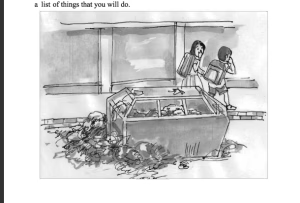Lesson 4: Responsibilities

The concept of responsibilities
The concept of responsibilities refers to duties or obligations that an individual must fulfill. Responsibilities can be divided into two categories:
- To Do Something: This refers to tasks or actions that are required, such as attending school, studying, helping others in need, taking care of parents, and participating in civic duties like voting.
- Not To Do Something: This refers to refraining from harmful or illegal actions, such as not stealing, not causing public inconvenience, or not violating laws.
In a broader sense, responsibilities are essential for maintaining order in society. They apply to individuals, communities, and governments, ensuring that everyone contributes positively to their environment.
A. Read the text about Responsibilities
Rony’s mother gave him 50 taka to buy salt and chilies. On his way to the market, Rony found a poor passerby trying to help a boy who was lying on the road, groaning. Coming closer, Rony saw that it was his classmate Tanim, who had been hit by a speeding motorbike. Immediately, he stopped a baby taxi and took Tanim to a clinic. From there, he phoned Tanim’s parents. When they arrived at the clinic, Rony returned home without the salt and chilies. He had used the money to pay the taxi driver.
Now, discuss in groups the following questions about Responsibilities:
- Did Rony do right or wrong? Why?
- What do you think his mother did when Rony returned home without the salt and chilies?
- What else could Rony have done in the situation?
- What do you understand by responsibility?
Answer of the questions:
1. Did Rony do right or wrong? Why?
- Rony did the right thing.
- He acted responsibly and prioritized helping his injured classmate Tanim, who was in immediate need of medical assistance. Saving a life or helping someone in distress is a moral and ethical duty, and in this case, Rony’s action was more important than buying the salt and chilies. His decision shows compassion and responsibility towards others.
2. What do you think his mother did when Rony returned home without the salt and chilies?
- Most likely, Rony’s mother understood the situation.
- Although she sent him to the market with a specific task, when she learned that he used the money to help an injured friend, she would probably have appreciated his responsible behavior. It’s reasonable to think that she would have been proud of Rony for prioritizing a person’s life over the groceries.
3. What else could Rony have done in the situation?
- Rony could have done a few things differently:
- He could have called for help and stayed with Tanim while waiting for an adult or an ambulance.
- Instead of using the money meant for salt and chilies, he could have asked the baby taxi driver to wait for Tanim’s parents to arrive and pay the fare.
- However, Rony took swift action, which was necessary in this emergency.
4. What do you understand by responsibility?
- Responsibility means fulfilling one’s duties and obligations in a way that benefits others and upholds moral principles.
- It involves taking care of what is expected of you, such as attending school or helping your family. At the same time, responsibility also includes responding to unexpected situations, like helping someone in need or making ethical decisions in difficult moments.
B. Read the text and answer the following question about Responsibilities:

What is responsibility?
Responsibility is a duty or an obligation to do something. For example, you have the responsibility to attend school and pursue your studies properly, to take care of your parents in their old age, and so on. You also have a responsibility to your society and the government, such as helping a neighbor in trouble or casting your vote if you are 18 or over.
Responsibility is also an obligation or a duty not to do something. For example, you have the responsibility not to steal a book from a public library or not to pile up your building materials on the footpath. These are your responsibilities as citizens. However, the government has responsibilities too.
Our government is responsible for providing its citizens with “the basic necessities of life, including food, clothing, shelter, education, and medical care.” The government also has the responsibility to protect the fundamental rights of its citizens, which include freedom of speech and expression, freedom of the press, freedom of religion, equality of all before the law, etc.
The knowledge, skills, and attitudes you have gained at home, at school, and in society will help you become aware of your responsibilities and carry them out effectively. Remember, fulfilling your responsibilities will be good for you, your family and friends, and your society and country as a whole.
Notes:
- The Constitution of the People’s Republic of Bangladesh, Part II.
- Part III, ibid (Ibid: abbreviation from Latin ibidem, meaning “in the same book or piece of writing as the one just mentioned.”)
C. Discuss in groups and write answers to these questions:

- Which persons and institutions do you have responsibilities towards? Make a list. The first in the list is done for you.
- a. Parents
- Make a list of responsibilities you have as a student at home, school, and in society.
- Make another list of things you shouldn’t do at home, school, and in society.
- Who helps you in discharging the responsibilities you have listed in C1? How do they help you?
- Are there any difficulties in fulfilling your responsibilities? Briefly describe them.
- Make a list of responsibilities other people have towards you. Briefly describe what might happen if they fail to fulfill their responsibilities.
- (a) What rewards are you likely to get if you fulfill your responsibilities?
(b) What penalties or punishments might you face if you do not carry out your responsibilities? - What responsibilities do you think you can perform well when you go on a class picnic or when your school stages a play as part of its annual prize-giving ceremony?
Answer of the Questions:
Which persons and institutions do you have responsibilities towards? Make a list.
The first in the list is done for you.
- Parents
- Siblings – Helping them with studies, supporting them emotionally, and taking care of them.
- Teachers – Listening to them, respecting their guidance, and completing homework or class tasks.
- School – Maintaining discipline, respecting school property, and participating in school activities.
- Friends – Offering support when they are in need, helping with schoolwork, and being loyal.
- Community – Following rules, helping neighbors, and keeping the environment clean.
- Government – Respecting the laws, paying taxes, and contributing to the country’s well-being.
Make a list of responsibilities you have as a student at home, school, and in society.
At home:
- Helping with household chores (cleaning, cooking, etc.).
- Respecting and supporting family members.
- Managing time effectively for studies and rest.
At school:
- Attending classes regularly and being punctual.
- Completing assignments and homework on time.
- Participating in school events and activities.
- Respecting school rules and the staff.
In society:
- Helping those in need, like neighbors or strangers in distress.
- Keeping public places clean.
- Following social norms and laws (e.g., traffic rules).
- Being respectful and kind to others.
Make another list of things you shouldn’t do at home, school, and in society.
At home:
- Disobeying or being disrespectful to parents and elders.
- Ignoring household chores.
- Wasting resources (like electricity, water, or food).
At school:
- Cheating in exams or copying assignments.
- Bullying or disrespecting classmates and teachers.
- Vandalizing school property.
In society:
- Littering or polluting public spaces.
- Disrespecting elders or violating social rules.
- Engaging in illegal activities (e.g., stealing, breaking traffic rules).
Who helps you in discharging the responsibilities you have listed in C1? How do they help you?
- Parents – They provide guidance, teach life skills, and offer financial support.
- Teachers – They offer knowledge, moral values, and discipline.
- Friends – They offer emotional support and assistance in schoolwork.
- Community members – They provide cooperation in community tasks and moral support.
- Government – It offers laws and policies that guide behavior and responsibilities.
Are there any difficulties in fulfilling your responsibilities? Briefly describe them.
Yes, there can be difficulties:
- Time management – Balancing responsibilities between home, school, and social activities can be challenging.
- Lack of resources – Sometimes, not having enough financial or physical resources can make fulfilling responsibilities harder.
- Peer pressure – Sometimes, friends or others can negatively influence decisions, making it difficult to carry out responsibilities.
- Stress – Managing stress from schoolwork, family expectations, and social obligations can be overwhelming at times.
Make a list of responsibilities other people have towards you. Briefly describe what might happen if they fail to fulfill their responsibilities.
- Parents – They should provide care, love, and support. If they fail, it can lead to emotional or financial struggles.
- Teachers – They should guide and educate properly. Failure may result in poor academic performance or lack of motivation.
- Government – It should provide security, education, and basic necessities. If it fails, citizens may suffer from poverty, lack of healthcare, or injustice.
- Friends – They should offer companionship and moral support. If they fail, it may lead to loneliness or a lack of trust.
(a) What rewards are you likely to get if you fulfill your responsibilities?
- Respect from family, teachers, and peers.
- Trust from others who rely on you.
- Personal satisfaction for doing the right thing.
- Opportunities – Fulfilling responsibilities often leads to better opportunities in school or career.
- Success in academics, relationships, and personal growth.
(b) What penalties or punishments might you face if you do not carry out your responsibilities?
- Loss of trust from parents, teachers, or friends.
- Punishment in school (detention, lower grades).
- Legal consequences if societal laws are broken.
- Personal guilt and dissatisfaction.
- Missed opportunities in education, career, or personal life.
What responsibilities do you think you can perform well when you go on a class picnic or when your school stages a play as part of its annual prize-giving ceremony?
- During a class picnic:
- Ensuring that everyone follows safety rules.
- Helping to clean up after meals and keeping the environment tidy.
- Assisting teachers in organizing activities.
- During a school play or event:
- Managing stage setups and props.
- Ensuring discipline among classmates.
- Assisting teachers and performers with coordination.
D. Look at the picture. Work in pairs.

Suppose this road is near your school. As students of this school, what responsibilities do you think you have to get rid of this nuisance? Make a list.
Answer of the question
The provided image depicts a road near a school with a garbage bin overflowing and trash scattered around. As students of this school, here are some responsibilities we can take to address this issue:
1. Clean up the area:
- Organize a school-wide cleanup event to collect and dispose of the trash properly.
- Volunteer to pick up litter regularly, especially around the school and the affected area.
2. Raise awareness:
- Create posters or presentations about the importance of keeping the environment clean and the negative consequences of littering.
- Organize campaigns to educate students and the community about proper waste disposal and recycling.
3. Report issues:
- Notify the school administration or local authorities about the overflowing garbage bin and any other environmental concerns.
- Encourage others to report any instances of littering or improper waste disposal.
4. Promote recycling:
- Set up recycling bins at school and encourage students to participate in recycling programs.
- Educate students about the benefits of recycling and how to properly sort recyclable materials.
5. Participate in community initiatives:
- Join local organizations or initiatives focused on environmental protection and waste management.
- Volunteer for community cleanup events and other activities that contribute to a cleaner environment.
The courses of ESOL in 8th Semester at Institute of Modern Languages
The courses of ESOL in 7th Semester at Institute of Modern Languages in DU
The courses of ESOL in 6th Semester at Institute of Modern Languages in DU
The courses of ESOL in 5th Semester in Institute of Modern Languages
The courses of ESOL in 4th Semester at Institute Modern Languages
The courses of ESOL in 3rd Semester at Institute of Modern Languages
The courses of first semester in ESOL at Institute of Modern Languages
The courses of second semester of esol pdf
Class 9 New Curriculum: Opinion Matters – Activity 1.1.1 Solutions 2025
Lesson 4 a warrior of light pdf| Lesson 4 a warrior of light answers
Lesson 2 the parrot’s tale pdf for HSC students in Bangladesh
Unit twelve education and life lesson 1 why education questions and answers
Unit 14 Lesson 3 |Our Art and Craft | Crafts in Our Time
Unit Eleven: Art and Craft Lesson 1: What is Beauty?
Lesson 5 The Tyger for HSC 2025 with Best Solutions
Lesson 4 A Minor Bird for HSC 2025
Lesson 3 Ecotourism for HSC 2025 with best solutions
Lesson 2 Arriving in the Orient for HSC 2025
Unit Nine : Tours and Travels Lesson 1 Travelling to a Village in Bangladesh
Lesson 3The Old Man at the Bridge by Ernest Hemingway for HSC 2025
Lesson 2 – Cruelties of Conflict HSC 2025
Lesson 4 Scaling a Mountain Peak or Riding Your Dream?
Unit 3: Life Style : Lesson 1: Manners around the world
Lesson 1 -Unforgettable History
Unit 2: Lesson 1 What is a dream?
Unit Three: Lifestyle Lesson 4: Fitness
Lesson 1: The Storm and Stress of Adolescence
Lesson 2: Adolescence and Some (Related) Problems in Bangladesh
Lesson 3 : Why Does a Child Hate School?
Lesson 5: Say ‘No’ to Bullying
Lesson 1: Sheikh Kamal: Life of an Achiever
Lesson 2 Affectionate, Lively and Always Smiling Sheikh Kamal
Lesson 3 Brojen Das: On Conquering the English Channel
Lesson 5 The Unbeaten Girls from Kalsindur
Unit Six: Relationships Lesson 3 A Mother in Mannville
Unit Seven: Human Rights Lesson 1: Are We Aware of These Rights-I?
Lesson 2: Are We Aware of These Rights – II?
Lesson 3: Rights to Health and Education
Lesson 4 Amerigo, a Street Child
MCQ Questions for DU with Answers and Detailed Explanations in 2024
Unit Eight: Peace and Conflict Lesson 1: Conflict: Causes and Types
The complete syllabus of IELTS 2025 for the best score
Suggestion For HSC Writing Part for HSC 2025/2026 with best answers
Lesson 3 the legend of gazi pdf download for HSC 2025
The Rise of Bengali Nationalism (1947-1970)
Lesson 1 Can you live alone PDF With Question & Best answer
History of East Pakistan from 1954 to 1971 With Best Resource
5 Powerful Insights Into Ghost Of Yōtei: Release Date
Catenative Verb কি with Best 10 examples
9 Essential Steps Of CV Writing For HSC Students With Format
